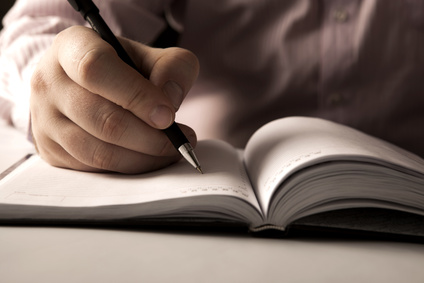How to Create a Writing Habit
4 thought on “How to Create a Writing Habit”
Comments are closed.
Related Post

The Writer’s NotebookThe Writer’s Notebook
The writer’s notebook, it’s not a diary or a journal but a valuable tool to help you develop your writing skills. It’s a place to be a writer.
A writer’s notebook can help you develop your writing skills through a variety of ways.
- A writer’s notebook will help you to pay attention to the world around you. By recording events, ideas, dialogue, people that you come across in your day, you become more aware of your surroundings, the setting, how people interact. In your notebook capture what moves you in the day. Perhaps it was a conversation you overheard, or person you saw, or something in nature that caught your attention. Write it down, explore what it means to you. Practice transforming what you see, hear, smell, touch, and taste during your day in to words on the page.
- A writer’s notebook will help you develop ideas. Your book is a place to capture seed ideas. Whether they are ideas for stories or scenes or even if you’re not sure what you plan to do with them. It’s a place to nurture ideas, keep them safe until you’ve ready to explore them further.
- A writer’s notebook can help you develop your creative writing skills. Practice scene writing, dialogue and descriptive writing. Heard a conversation, recreate it in words on the page, what did they say, how did they say it. It can teach you to listen. It can teach you to be aware to details.
- A writer’s notebook can help you to expand your vocabulary. Record favourite words, unusual words you hear in your day, or a new word you’ve recently learned.
- A writer’s notebook is a place to explore your memories bring them out of your head and onto the page.
- A writer’s notebook is a place to map a story, draw a plot line, sketch a setting, or draw a character, maybe an ancestor?
Spend 10-15 minutes a day free writing in your writer’s notebook. Carry it with you throughout the day. It will help you to develop your voice and your sense of self as a writer.
Don’t restrict your entries to family history thoughts and ideas. Our ancestors lived in the real world. They interacted with the world around them. Observing your world today can help you add tremendous detail to your stories and help you to learn the tools of character, setting, dialogue and description enhancing your creative writing skills.
Here are a few prompts to help you get your notebook started.
- A gesture, word or phrase you found interesting
- A conversation you overheard
- An interesting person who you met or observed
- A person from your past, you want to remember
- A description of a photograph
- What you see outside the window
- Surroundings you may have passed in your daily travels
- A quote you heard today
- A dish or meal that you made or ate, note its characteristics using all your senses or just one.
One thing is certain, to become a better writer; you must be an observer of the world and you must practice writing. Starting a writer’s notebook is an opportunity to incorporate both into your daily routine.
Very interested in your writing workshop.
Hi Lynn, I love your classes, they have opened many new ways to think about the story. One problem, I do need closed captions. I hope to get hearing aids soon, but until then I cannot hear words on my computer. Would you be able to add closed captions to both the Outline Class and to these videos? Even if you cannot retrofit, could this work in the future. You give enough to think about in each video and class that I do appreciate getting to hear it again. Would it be easier to provide a print-out to email us? Anyway, thanks for your experience and skill in giving such great guides.
I’ll make this happen Joan.
I’ve registered for the Intensive level and I’m back for my 11th year. I am finally at a place where I am retired–so I have the time, and I’ve gotten organized so I know where I’m going. I’ve applied to a local writers’ workshop for a 10-month manuscript course and I’m still waiting to hear if I’ve been selected. The program doesn’t start till March.
Also, I now have the framework for the novel I’ve been trying to write from forever ago and have selected a different place to start the story. I’ve started writing the first chapter, and I’m excited to get a writing habit established! Habits are a hard thing for this ADHD procrastinator, so I’m really honing in this time around.
Also, when I left North Carolina I left my old start-up behind. I’m now in the validation stage of rethinking how I want to make an impact in the genealogical writing community.